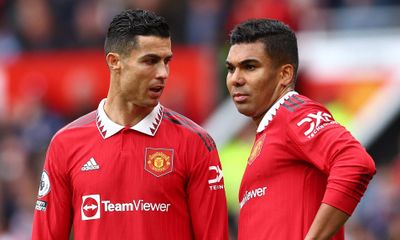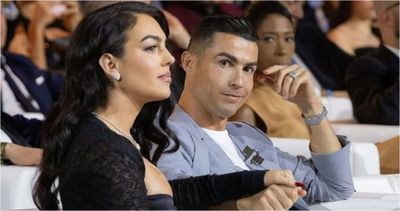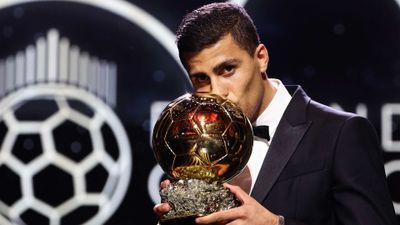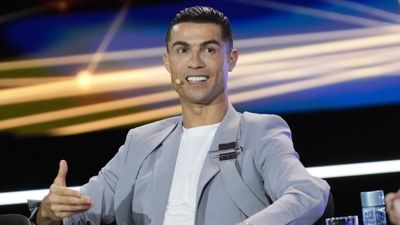Quick Betimate
Popular Leagues
-
UEFA Nations League
-
England (29)
- FA Cup (1)
- Premier League (11)
- Championship
- League 1 (2)
- League 2 (2)
- National League (2)
- National League North (1)
- National League South (1)
- EFL Trophy
- Premier League 2
- Championship Women
- Derbyshire Senior Cup
- Development League 2
- FA Cup Women (1)
- FA Trophy
- FA Vase
- Isthmian Division One North
- Isthmian Division One South
- Isthmian Premier Division
- National League Cup
- Northern League Division One
- Northern Premier League
- Reserve Matches
- Southern Premier League Central
- Southern Premier League South
- Super League Women
- U21 Premier League Cup (1)
- Northern Ireland Championship
- Northern Ireland Championship Women (3)
- Northern Ireland Cup
- Northern Ireland Intermediate Cup
- Northern Ireland League Cup Women
- Northern Ireland Play-Offs
- Northern Ireland Premier
- Northern Ireland Premier Intermediate League
- Northern Ireland Premier League Women (4)
- Northern Ireland Reserve League
- Scotland Regional Cup
- Wales League Cup Women
-
UEFA Champions League (1)
-
UEFA Europa League (1)
-
Spain (121)
- La Liga (7)
- Segunda (11)
- Tercera Group 1 (4)
- Tercera Group 2 (4)
- Tercera Group 3 (4)
- Tercera Group 4 (4)
- Tercera Group 5 (4)
- Tercera Group 6 (4)
- Tercera Group 7 (4)
- Tercera Group 8 (4)
- Tercera Group 9 (4)
- Tercera Group 10 (4)
- Tercera Group 11 (4)
- Tercera Group 12 (4)
- Tercera Group 13 (4)
- Tercera Group 14 (4)
- Tercera Group 15 (4)
- Tercera Group 16 (4)
- Tercera Group 17 (4)
- Tercera Group 18 (4)
- Youth League
- Copa De La Reina (1)
- Copa del Rey
- Kings League - 40 mins play (2)
- Primera Division RFEF Group 1 (10)
- Primera Division RFEF Group 2 (10)
- Primera Federacion Women
- Primera Women (8)
- Queens League - 40 mins play
- Regional Cup
- Regional League
- Segunda Division RFEF Group 1
- Segunda Division RFEF Group 2
- Segunda Division RFEF Group 3
- Segunda Division RFEF Group 4
- Segunda Division RFEF Group 5
- Segunda Division RFEF Play-Offs
- Segunda Federacion Women
- Tercera Federacion Women
- Women Regional League
-
USA (764)
-
Germany (209)
- Bundesliga I (9)
- Bundesliga II (9)
- DFB Pokal (1)
- Regionalliga Bayern (9)
- Regionalliga North (9)
- Regionalliga North East (9)
- Regionalliga South West (9)
- Regionalliga West (8)
- Oberliga Baden-Wuerttemberg (9)
- Oberliga Bayern North (9)
- Oberliga Bayern South (8)
- Oberliga Bremen (8)
- Oberliga Hamburg (9)
- Oberliga Hessen (10)
- Oberliga Mittelrhein (8)
- Oberliga Niederrhein (9)
- Oberliga Niedersachsen (1)
- Oberliga NOFV Nord (8)
- Oberliga NOFV Sud (8)
- Oberliga Rheinland-Pfalz/Saar (8)
- Oberliga Schleswig-Holstein (8)
- Oberliga Westfalen (1)
- 3. Liga (10)
- Bundesliga II Play-Offs
- Bundesliga II Women (7)
- Bundesliga Play-Offs
- Bundesliga U19 (24)
- Bundesliga Women
- DFB Pokal Women
- Regionalliga Play-Offs
- U19 Cup (1)
-
Italy (34)
- Serie A (10)
- Serie B
- Serie C Group A
- Serie C Group B
- Serie C Group C
- Campionato Nazionale
- Campionato Primavera 1 (10)
- Campionato Primavera 2 (4)
- Serie D
- Coppa Italia (1)
- Coppa Italia Women (1)
- Campionato Primavera 3
- Campionato Primavera 4
- Serie A Women
- Serie B Play-Offs
- Serie B Women
- Serie C Play-Offs (5)
- Serie C Super Cup (1)
- Serie D Play-Offs (2)
- U19 League Women
-
France (24)
-
Netherlands (27)
-
Scotland (16)
-
Australia A-League (4)
-
Japan J-League (2)
-
Japan J2-League (10)
-
Indonesia Liga 1 (9)
-
Denmark Superligaen (6)
-
Colombia Primera A (1)
-
Lebanon League (2)
-
Iran Pro League (8)
-
Esport (202)
Other Leagues
-
Albania
-
Algeria (25)
-
Andorra (8)
-
Angola (8)
-
Argentina (94)
- Nacional B (19)
- Primera B Metropolitana (11)
- Primera C Metropolitana (14)
- Reserve League (1)
- Cup (3)
- Torneo A (18)
- Copa Santa Fe
- Championship Women (8)
- Copa de la Liga Profesional
- Copa Santa Fe Women
- Liga Profesional
- Liga Profesional Reserves (12)
- Nacional Reserve League (6)
- Regional League (2)
- Youth League
-
Armenia (9)
-
Aruba
-
Australia (138)
- A-League (4)
- A-League Women (1)
- Capital Territory NPL2 (4)
- Capital Territory NPL2 U23 League
- Capital Territory Premier League (4)
- Capital Territory Premier League Women
- Capital Territory Premier League Women Reserves
- Capital Territory U23 League
- Cup (1)
- Cup Qualifying (1)
- Darwin Premier League (2)
- FFA Cup Qualifying
- New South Wales League 1 (8)
- New South Wales League 2
- New South Wales NPL Women (7)
- New South Wales NPL2 Women
- New South Wales Premier League (8)
- New South Wales U20 League (6)
- Northern NSW Division 1 (5)
- Northern NSW Premier League (3)
- Northern NSW Premier League Women
- Northern NSW Reserves League (2)
- NPL Queensland (1)
- NPL Queensland U23 (1)
- NPL Queensland Women (1)
- NPL Victoria (7)
- NPL Victoria U23
- NPL Victoria Women (6)
- NSW League 1 U20
- NSW League 2 U20
- Queensland PL 2 U23
- Queensland PL U23
- Queensland Premier League (6)
- Queensland Premier League 2 (8)
- Queensland Premier League 2 Women
- Queensland Premier League 3 (2)
- Queensland Premier League 4
- Queensland Premier League Women (2)
- SA Premier League Reserves
- SA Premier League Women (5)
- SA Premier League Women Reserves
- South Australia Premier League (6)
- South Australia State League 1 (6)
- South Australia State League Reserves
- Sunday League Premier Division
- Sunday League Premier Division Reserve
- Tasmania Championship (4)
- Tasmania Championship 1
- Tasmania Championship Women
- Tasmania NPL U21 League
- Tasmania Premier League (4)
- Tasmania South Division 1
- Tasmania Super League Women
- Victoria PL 1 U23
- Victoria Premier League 1 (7)
- Victoria Premier League 2
- Victoria Premier League Women
- Victoria State League 1
- Victoria State League 1 Reserves
- Victoria State League 2
- Victoria State League 2 Reserves
- WA Premier League Women (4)
- WA Premier League Women U21
- WA State League 1 Reserves
- Western Australia Premier League (6)
- Western Australia State League 1 (6)
- Western Australia State League 1 Women
- Western Australia State League 2
- Western Australia U23 League
- Australian Matches
-
Austria (41)
-
Azerbaijan (11)
-
Bahrain (6)
-
Bangladesh (6)
-
Barbados
-
Belarus (10)
-
Belgium (10)
-
Belize
-
Benin
-
Bhutan
-
Bolivia (16)
-
Bosnia & Herzegovina (16)
-
Botswana (8)
-
Brazil (183)
- Serie A (10)
- Serie B (2)
- Serie C (10)
- Campeonato Amapaense (1)
- Campeonato Baiano 2 (5)
- Campeonato Brasileiro A2 Women (9)
- Campeonato Brasileiro Serie B U20 (8)
- Campeonato Carioca A2 (6)
- Campeonato Goiano 2 (4)
- Campeonato Maranhense (2)
- Campeonato Mineiro 2 (5)
- Campeonato Mineiro U20 (6)
- Campeonato Paranaense 2 (5)
- Campeonato Paulista A4
- Campeonato Paulista U20 (24)
- Campeonato Rondoniense
- Campeonato U20 Women
- Copa Espirito Santo (4)
- Copa Nordeste (4)
- Copa Rio Women
- Copa Verde
- Matches
- Matches Women
- Paraense
- Paulista Serie B
- Paulista Women (4)
- Serie A U20 (8)
- Serie A1 Women (8)
- Serie A2 Women
- Serie A3 Women (16)
- Serie D (1)
- U20 Cup (1)
- U20 League (24)
- U20 Women Cup
- Copa do Brasil (16)
- Women’s Friendly
-
Bulgaria (20)
-
Burkina Faso
-
Burundi
-
Cambodia (6)
-
Cameroon (6)
-
Canada (7)
-
Chile (23)
-
China (38)
-
Colombia (17)
-
Costa Rica (3)
-
Côte d’Ivoire
-
Croatia (22)
-
Cuba
-
Cyprus (3)
-
Czech Republic (76)
-
Denmark (48)
-
Djibouti
-
Dominica
-
Dominican Republic
-
Ecuador (16)
-
Egypt (24)
-
El Salvador (9)
-
Estonia (20)
-
Ethiopia (2)
-
Faroe Islands (12)
-
Fiji
-
Finland (129)
-
Gambia (3)
-
Georgia (10)
-
Ghana (10)
-
Gibraltar
-
Greece (11)
-
Guatemala (2)
-
Haiti
-
Honduras (4)
-
Hong Kong SAR China (8)
-
Hungary (17)
-
Iceland (46)
-
India (7)
-
Indonesia (11)
-
Iran (19)
-
Iraq (2)
-
Ireland (28)
- Republic of Ireland FAI Cup (7)
- Republic of Ireland FAI Intermediate Cup
- Republic of Ireland First Division (5)
- Republic of Ireland Leinster Senior Cup
- Republic of Ireland Leinster Senior League (1)
- Republic of Ireland Munster Senior League (4)
- Republic of Ireland National League Women (6)
- Republic of Ireland Premier Division (5)
- Republic of Ireland U20 League
-
Israel (16)
-
Jamaica
-
Japan (43)
-
Jordan
-
Kazakhstan (14)
-
Kenya (11)
-
Kuwait (2)
-
Kyrgyzstan
-
Latvia (13)
-
Lebanon (2)
-
Liechtenstein (1)
-
Lithuania (21)
-
Luxembourg (11)
-
Macau SAR China
-
Macedonia (15)
-
Malawi (9)
-
Malaysia (2)
-
Mali (7)
-
Malta (2)
-
Mauritania
-
Mexico (9)
-
Moldova (5)
-
Mongolia
-
Montenegro (9)
-
Morocco (8)
-
Mozambique
-
Myanmar (Burma) (3)
-
Namibia
-
Nepal (1)
-
New Zealand (11)
-
Nicaragua (2)
-
Niger (1)
-
Nigeria (10)
-
Norway (70)
- Eliteserien (8)
- Division 1 (8)
- Cup (8)
- Cup Women (1)
- Division 1 Play-Offs
- Division 1 Women (6)
- Division 2 Group 1 (1)
- Division 2 Group 2 (1)
- Division 2 Group 3
- Division 3 Group 1 (7)
- Division 3 Group 2 (2)
- Division 3 Group 3 (7)
- Division 3 Group 4 (7)
- Division 3 Group 5 (7)
- Division 3 Group 6 (1)
- Interkretsserie U19 (1)
- Toppserien Women (5)
- U19 Elite League
- Youth Cup
-
Oman
-
Panama (2)
-
Paraguay (18)
-
Peru (17)
-
Philippines
-
Poland (70)
-
Portugal (31)
-
Puerto Rico
-
Qatar (2)
-
Romania (60)
-
Russia (55)
-
Rwanda (8)
-
Saint Kitts and Nevis
-
San Marino (1)
-
Saudi Arabia (23)
-
Senegal
-
Serbia (17)
-
Seychelles
-
Sierra Leone
-
Singapore (5)
-
Slovakia (31)
-
Slovenia (14)
-
Solomon Islands
-
South Africa (16)
-
South Korea (32)
-
Suriname
-
Sweden (100)
- Europe Friendlies
- Allsvenskan Qualification
- Superettan Qualification
- 1.div Norra (8)
- Cup (7)
- 1.div Södra (8)
- 2.div Norra Götaland (7)
- 2.div Norra Svealand (7)
- 2.div Norrland (4)
- 2.div Södra Götaland (7)
- 2.div Södra Svealand (7)
- 2.div Västra Götaland (7)
- Allsvenskan (8)
- Cup Women (1)
- Damallsvenskan (7)
- Elitettan (7)
- Juniorallsvenskan (7)
- Superettan (8)
-
Switzerland (22)
-
Taiwan
-
Tajikistan
-
Tanzania (4)
-
Thailand (5)
-
Togo
-
Trinidad and Tobago (6)
-
Tunisia (26)
-
Turkey (24)
- Türkiye 1 Lig (2)
- Türkiye 2 Lig Beyaz (1)
- Türkiye 2 Lig Kirmizi (1)
- Türkiye 2.Lig Play-offs
- Türkiye 3. Lig Promotion Group Play-off (4)
- Türkiye 3.Lig Group 1 (2)
- Türkiye 3.Lig Group 2
- Türkiye 3.Lig Group 3
- Türkiye 3.Lig Group 4 (2)
- Türkiye Cup (1)
- Türkiye Super Lig (10)
- Türkiye U19 League (1)
- Türkiye Womens League
-
Uganda (1)
-
Ukraine (27)
-
United Arab Emirates (18)
-
Uruguay (9)
-
Uzbekistan (13)
-
Venezuela (13)
-
Vietnam (15)
-
Wales (1)
-
Zambia (9)
-
Zimbabwe
The All-Time Top Scorer: Who has had the most goals in football history?

The discussion abuout who has scored the most goals in football history is frequently a subject of controversy, resulting in diverse lists. FIFA has never published an official record or list of players who had the most goals in football history, which makes it even more challenging to confirm these rankings officially. However, this particular list relies on the data compiled by the International Federation of Football History & Statistics (IFFHS).
Cristiano Ronaldo and Lionel Messi are undoubtedly among the greatest players to have ever graced the beautiful game. The never-ending discussion about which superstar is superior has persisted for over a decade. These two legendary figures have not only left an indelible mark on football but have also contributed to shaping the sport into what it is today. Their remarkable goal-scoring prowess has solidified their status as some of the most exceptional players in the history of football. However, there are other remarkable goal scorers who join them on this illustrious list of prolific strikers.
Who has scored the most goals in football history?
As of June 2023, Cristiano Ronaldo holds the esteemed title of player who had who had the most goals in football. At the age of 38, the Portuguese footballer, who currently competes for the Saudi league Al Nassr, has remarkably scored 837 goals in 1,166 matches for both club and country. Having been awarded the prestigious Ballon d'Or five times, he is widely recognized as the most prolific striker of his generation and holds the record for being the leading goal scorer in men's international football.
Cristiano Ronaldo also the players having the most international goals. He holds the remarkable record for the most goals scored in international men's football, with a tally of 122 goals in 198 matches and still counting.
Since his debut for the Portuguese national team in 2003, Cristiano Ronaldo has consistently found the back of the net, showcasing his exceptional goal-scoring prowess. His goal-scoring prowess is further emphasized by the fact that he has recorded an impressive ten hat-tricks in international football, which is also the highest number of hat-tricks achieved at the international level.
Top 10 highest-goal scorers in football history
Cristiano Ronaldo
| Full Name | Cristiano Ronaldo dos Santos |
| Rank | 1 |
| National team | Portugal |
| Total goals | 837 |
| Appearance | 1166 |
| Current clubs/ Retired | Al-Nassr FC |
| Career span | 2002–present |
Cristiano Ronaldo dos Santos Aveiro, a 38-year-old professional footballer from Portugal, serves as a forward and captain for both the Saudi Professional League club Al Nassr and the Portugal national team. He is undeniably the greatest goalscorer who has scored the most goals in football history based on factual evidence.
Ronaldo is unanimously recognized as one of the all-time greats in the world of football. With five Ballon d'Or awards and four European Golden Shoes to his name, he holds the record for the most European Golden Shoes won by a player from Europe. Throughout his illustrious career, he has amassed an impressive collection of 32 trophies, including seven league titles, five UEFA Champions League titles, the UEFA European Championship, and the UEFA Nations League. In 2015, the Portuguese Football Federation bestowed upon him the title of the best Portuguese player of all time.
In 2016, Ronaldo led Portugal to their first major tournament victory at Euro 2016, where he also secured the Silver Boot as the second-highest goal scorer of the tournament. This remarkable achievement earned him his fourth Ballon d'Or.
Alongside Lionel Messi, Ronaldo is widely regarded as one of the two greatest players of his generation. He clinched his first Ballon d'Or in 2008 at the age of 23, setting a record for the highest number of votes received. Over the following decade, he consistently sparked debates about who is the greatest player in football history.
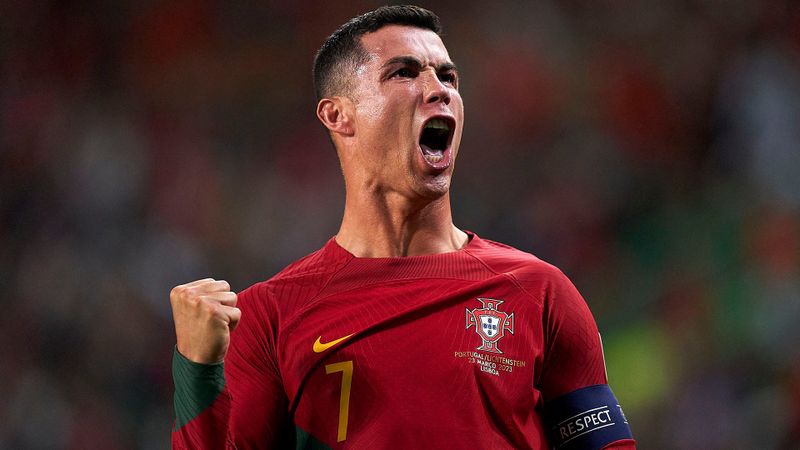
Cristiano Ronaldo
Ronaldo's reputation as a prolific and dependable goal scorer is unparalleled. He is renowned for his ability to make a significant impact and turn the tide of a game, particularly in crucial and high-pressure situations.
Ronaldo stands among a select few players who have amassed over 1,100 appearances throughout their professional careers. Furthermore, he has netted over 800 official senior career goals for both club and country. In an extraordinary achievement during an October 2022 Premier League match against Everton, Ronaldo reached a significant milestone by scoring his 700th career club goal in only 945 games. This accomplishment distinguishes him as the only player to have achieved such a remarkable feat, further enhancing his already impressive array of records in international football.
In September 2021, the Portuguese star surpassed Iran's Ali Daei as the most prolific goal scorer in the history of international football. Ronaldo's two goals against the Republic of Ireland on that memorable day propelled him beyond Daei's record of 109 goals. Since then, Ronaldo has continued to expand his goal tally, currently standing at an impressive 122 international goals.
Ronaldo's unwavering hunger for scoring goals remains as intense as ever, and it would not be surprising to witness his relentless pursuit of reaching the illustrious 900-goal mark before his playing days conclude.
Lionel Messi
| Full Name | Lionel Andrés Messi Cuccitini |
| Rank | 2 |
| National team | Argentina |
| Total goals | 806 |
| Appearance | 1027 |
| Current clubs/ Retired | Inter Miami |
| Career span | 2004–present |
Lionel Messi is undoubtedly one of the greatest footballers in the history of the sport, and many consider him to be the finest player to have ever graced the soccer field.
As a forward for Paris Saint-Germain, Messi has achieved a multitude of incredible individual records, thanks to his extraordinary brilliance on the pitch. Often hailed as the "ultimate playmaker of the 21st century," he is widely regarded as one of the most prolific Argentine footballers of all time.
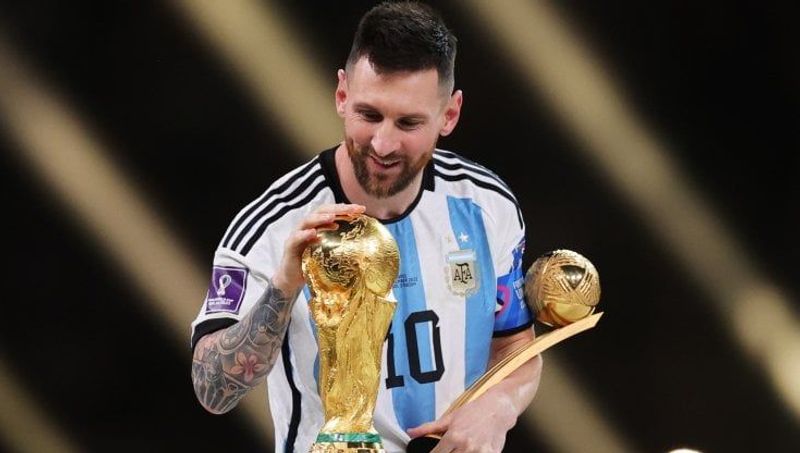
Lionel Messi
Messi, who is also among the wealthiest footballers in the world, has an unprecedented collection of seven Ballon d'Or awards and six European Golden Shoes. A remarkable goalscorer and creative playmaker, he holds numerous records such as the most goals scored in La Liga (474), the most hat-tricks in La Liga (36) and the UEFA Champions League (eight), the most assists in La Liga (192) and the Copa América (17). Additionally, Messi holds the record for the most international goals by a South American male player (102). With over 800 senior career goals for both club and country, he also holds the record for the most goals scored for a single club by an individual (704).
Having won his first Ballon d'Or at the age of 22, Messi went on to claim six more of these prestigious awards. He has triumphed in every major club-level tournament and has secured every major international trophy with Argentina, including the Copa America and the World Cup.
As the captain of the Albiceleste, Messi's goal-scoring prowess has propelled him to become one of players who had scored the most goals in football history, with over 800 career goals to his name.
Josef Bican
| Full Name | Josef Bican |
| Rank | 3 |
| National team | Austria |
| Total goals | 805 |
| Appearance | 530 |
| Current clubs/ Retired | --- |
| Career span | 1931-1955 |
Josef "Pepi" Bican, an Austrian-Czech professional footballer renowned as one of the greatest players having the most goals in football, excelled as a striker throughout his career.
While the precise number of Bican's goals remains a subject of debate, particularly due to his prolific period coinciding with the Second World War, there is no denying his extraordinary ability to find the back of the net. According to the Rec.Sport.Soccer Statistics Foundation (RSSSF), Bican, born in Vienna, scored a remarkable 948 goals in 624 matches between 1931 and 1957. In 2020, FIFA officially credited Bican with 805 goals.
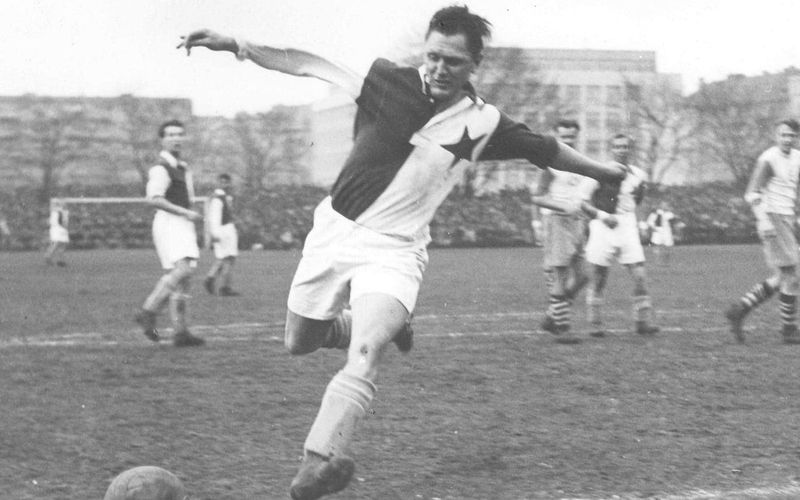
Josef Bican
Bican commenced his professional journey with Rapid Vienna in 1931 before making a transfer to local rivals Admira Vienna after four years. He secured four league titles during his tenure in Austria before joining Slavia Praha in 1937, where he remained until 1948 and became the club's all-time leading goal scorer.
Subsequently, Bican represented FC Vitkovice, FC Hradec Králové, and Dynamo Praha, retiring in 1955 as the all-time top scorer in the Czechoslovak First League with an astonishing 447 goals to his name.
According to UEFA, the governing body for European football, Bican holds the record for being the all-time leading goal scorer in European top-flight leagues, tallying 518 goals (447 in Czechoslovakia and 71 in Austria). His remarkable feat places him marginally ahead of Hungarian legend Ferenc Puskás.
Pelé
| Full Name | Édson Arantes do Nascimento |
| Rank | 4 |
| National team | Brazil |
| Total goals | 765 |
| Appearance | 812 |
| Current clubs/ Retired | --- |
| Career span | 1956-1977 |
Edson Arantes do Nascimento, widely known by his nickname Pelé, was a Brazilian professional forward who is considered one of the greatest players of all time.
Pelé achieved immense success and popularity, making him one of the most influential sports figures of the 20th century. In 1999, the International Olympic Committee named him Athlete of the Century, and he was included in Time magazine's list of the 100 most significant people of the 20th century.
In 2000, Pelé was voted World Player of the Century by the International Federation of Football History & Statistics (IFFHS) and was one of the joint winners of the FIFA Player of the Century award. Similar to Bican and Romario, Pelé has claimed to have scored more goals than officially recognized.
When Lionel Messi reportedly broke the record for the most goals for a single club in December 2020, Pelé's former club Santos disputed the claim, arguing that 448 goals were not accounted for in the records. Pelé himself took to Instagram to assert that his career total stood at 1,283 goals.
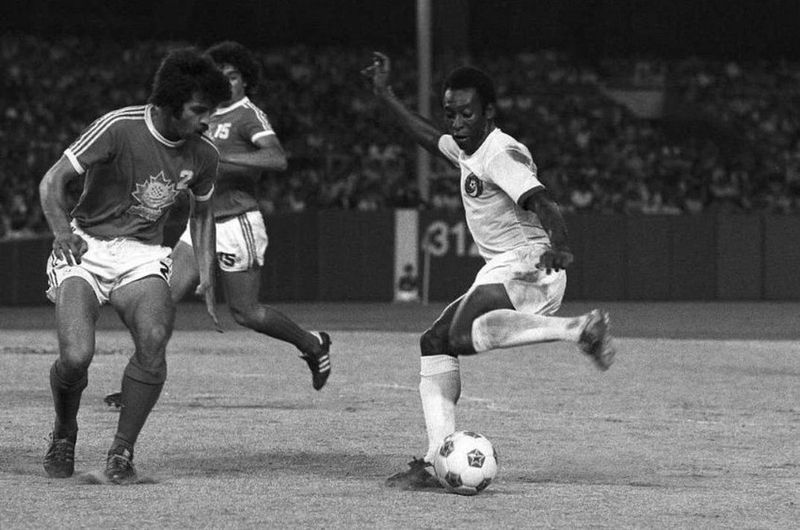
Pelé
According to the Guinness World Records, Pelé is credited with scoring 1,279 goals in 1,363 games, including friendlies. However, the IFFHS recognizes him for netting 762 goals. During his international career, Pelé won three FIFA World Cups: in 1958, 1962, and 1970. He is the only player to have achieved this feat and was also the youngest player to win a World Cup at the age of 17. Following the 1958 tournament, he earned the nickname "O Rei" (The King). Pelé is Brazil's joint-top goalscorer with 77 goals in 92 games.
At the club level, Pelé was Santos's players having the most goals in football with 643 goals in 659 games for this club. He is credited with connecting the phrase "The Beautiful Game" with football, and his electrifying style of play and knack for scoring spectacular goals made him a global superstar. Pelé's teams also embarked on international tours to capitalize on his immense popularity.
Throughout his career and even after retirement, Pelé received numerous individual and team awards for his performances, record-breaking achievements, and lasting legacy in the sport.
On December 29, 2022, at the age of 82, Pelé passed away due to multiple organ failure caused by complications of colon cancer. He is widely regarded as the greatest goal scorer in the history of football.
Romário
| Full Name | Romário de Souza Faria |
| Rank | 5 |
| National team | Brazil |
| Total goals | 753 |
| Appearance | 963 |
| Current clubs/ Retired | Retired |
| Career span | 1985-2009 |
Romário de Souza Faria, known simply as Romário, is a 57-year-old Brazilian politician and former professional footballer. Renowned for his clinical finishing, Romário was a prolific striker who scored over 700 goals, establishing himself as one of the highest goal scorers in the history of football. He is widely regarded as one of the greatest players of all time and gained 5th position in the list " Players who had scored the most goals in football history".
Romário played a crucial role in Brazil's triumph in the 1994 FIFA World Cup, where he received the Golden Ball as the tournament's best player. He was also named FIFA World Player of the Year in the same year. His exceptional contributions to the sport were acknowledged when he finished fifth in the FIFA Player of the Century internet poll in 1999. In 2002, he was elected to the FIFA World Cup Dream Team and was included in the prestigious FIFA 100 list of the world's greatest living players in 2004.
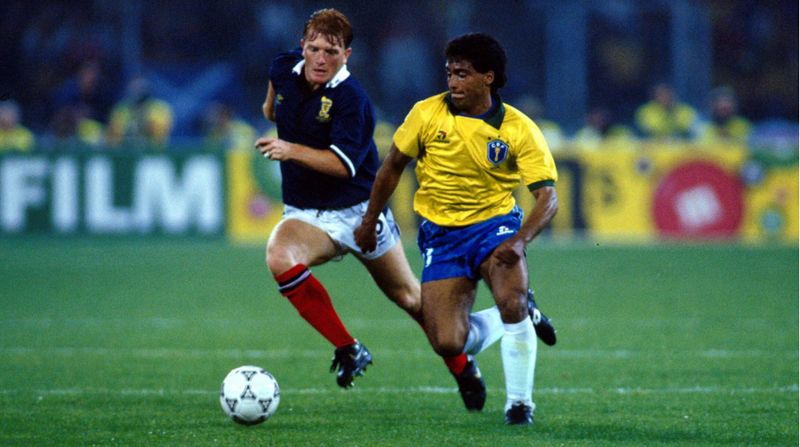
Romário
During his time at PSV Eindhoven, Romário enjoyed five successful seasons, winning the Eredivisie title three times and scoring an impressive 165 goals in 167 games. In 1993, he made a move to FC Barcelona, where he became a vital part of Johan Cruyff's "Dream Team." Romário formed an exceptional strike partnership with Hristo Stoichkov and helped Barcelona clinch the La Liga title in his first season. He finished as the league's top goalscorer with 30 goals in 33 matches.
In the latter stages of his career, Romário played for clubs in Rio de Janeiro, Brazil. He won the Brazilian league title with Vasco da Gama in 2000 and claimed the league's top scorer award three times. Additionally, Romário had brief stints in Qatar, the United States, and Australia.
Renowned for his mastery within the penalty area, Romário excelled in confined spaces. His rapid speed over short distances, aided by his low center of gravity, allowed him to elude defenders. He was particularly known for his trademark toe poke finish.
Romário's achievements extended to the international stage as well. With 55 goals in 70 appearances, he is the fourth-highest goalscorer for the Brazil national team, behind Pelé, Neymar, and Ronaldo. In the Brazilian league, Romário ranks third on the all-time list of top scorers with 155 goals.
As of April 2023, Romário is currently serving as a senator in Rio de Janeiro, further contributing to the society beyond his illustrious football career.
Ferenc Puskás
| Full Name | Puskás (geb.Purczeld) Ferenc |
| Rank | 6 |
| National team | Hungary |
| Total goals | 741 |
| Appearance | 746 |
| Current clubs/ Retired | --- |
| Career span | 1943-1967 |
Ferenc Puskás, originally named Ferenc Purczeld, was a Hungarian football player and manager who is widely regarded as one of the greatest players of all time and the sport's first international superstar.
Puskás, primarily playing as a forward, displayed exceptional prowess and scored an astonishing 84 goals in 85 international matches for Hungary. He also represented Spain in four international matches. He achieved Olympic glory in 1952 and led his nation to the final of the 1954 World Cup. Puskás's illustrious career included three European Cups (1959, 1960, 1966), ten national championships (five in Hungary and five in the Spanish Primera División), and eight top-individual scoring honors. Nicknamed the "Galloping Major," he was acknowledged as the greatest top-division scorer of the 20th century by the IFFHS in 1995.
Puskás claimed the title of top scorer in the Hungarian League on four occasions, and in 1948, he led Europe in goalscoring. In 1958, following the Hungarian Revolution, he emigrated to Spain and joined the esteemed LaLiga club, Real Madrid. During his tenure with Real Madrid, Puskás won four Pichichis and netted seven goals in two European Champions Cup finals. In total, he scored an impressive 619 goals in 618 matches across the Hungarian and Spanish leagues, as well as National Cups.
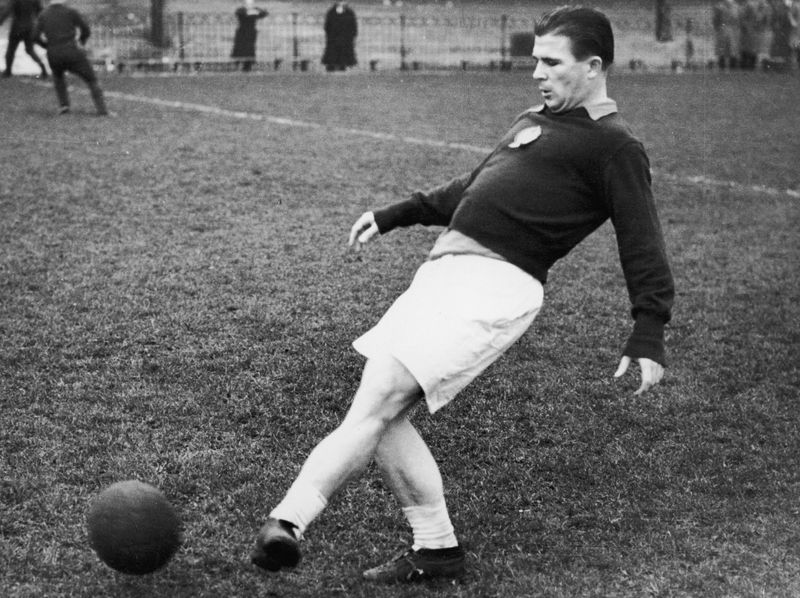
Ferenc Puskás
After retiring as a player, Puskás transitioned to coaching. One of the highlights of his coaching career occurred in 1971 when he guided Greek side Panathinaikos to the European Cup final, where they faced Eredivisie giants AFC Ajax and suffered a 2-0 defeat. In 1993, he returned to Hungary and temporarily took charge of the Hungarian national team. Puskás's impact extended beyond the field, as he became one of the first-ever FIFA/SOS Charity ambassadors in 1998.
In recognition of his legacy, the Népstadion in Budapest was renamed the Puskás Ferenc Stadion in 2002. He was also honored as the best Hungarian player of the last 50 years by the Hungarian Football Federation in the UEFA Jubilee Awards in November 2003. In October 2009, FIFA introduced the FIFA Puskás Award, bestowed upon the player who scored the "most beautiful goal" in the previous year. Additionally, Puskás was included in Pelé's FIFA 100, a list of the greatest living players.
Puskás possessed excellent ball control, particularly with his left foot, and displayed exceptional first-touch skills, providing quick and precise passing and crossing. He exhibited versatility on the pitch by swiftly maneuvering and changing positions from inside left to center forward. Puskás excelled in set-piece situations, often scoring powerful direct free-kicks and even finding the net directly from corner kicks. He possessed one of the most powerful left shots in football history and frequently scored from distances of 30 to 35 meters.
Ferenc Puskás remains one of players having the most goals in football, leaving an indelible mark on the sport.
Gerd Müller
| Full Name | Gerhard Müller |
| Rank | 7 |
| National team | Germany |
| Total goals | 735 |
| Appearance | 793 |
| Current clubs/ Retired | --- |
| Career span | 1962-1983 |
Gerhard "Gerd" Müller, a German professional footballer, is widely regarded as one of the greatest players in the history of football. He stands in the 7th of "Players who has scored the most goals in football history" ranking.
Müller, known as a clinical striker, was particularly renowned for his finishing ability, especially within the six-yard box. He stands among the sport's greatest goal scorers, having achieved remarkable success at both club and international levels. He is one of only nine players to have won the FIFA World Cup, the UEFA Champions League, and the Ballon d'Or. The majority of his career was spent at Bayern Munich, where he amassed a staggering 563 goals and set numerous Bundesliga records, many of which have since been surpassed by Robert Lewandowski, such as the record for the most goals in a single league season. Müller earned the nickname "Bomber der Nation" ("the nation's Bomber") or simply "Der Bomber" and was crowned the European Footballer of the Year in 1970.
Following a successful season with Bayern Munich, Müller continued his remarkable form at the 1970 FIFA World Cup for West Germany, scoring 10 goals and receiving the Golden Boot as the tournament's top goalscorer. He also won the prestigious Ballon d'Or in the same year. In 1972, Müller played a pivotal role in Germany's victory at the UEFA European Championship, finishing as the tournament's leading goalscorer with two goals in the final. Two years later, he scored four goals in the 1974 World Cup, including the decisive goal in the final.

Gerd Müller
Müller held the all-time goal-scoring record in the World Cup with 14 goals for an impressive 32 years. In 1999, he was ranked ninth in the European Player of the Century election by the International Federation of Football History & Statistics (IFFHS), and he secured the 13th position in the IFFHS' World Player of the Century election. In 2004, Müller was honored by Pelé's inclusion of his name in the FIFA 100 list of the world's greatest living players.
After retiring from his active football career in 1982, Müller faced personal challenges and battled with alcoholism. However, his former teammates at Bayern Munich convinced him to seek help and undergo alcohol rehabilitation. Following his recovery, Müller was offered a coaching role at Bayern Munich II, which he held from 1992 until his retirement in 2014 due to health issues. Additionally, the renowned German sportswear brand Adidas released a collection named after Gerd Müller as part of the Adidas Originals series. In July 2008, the Rieser Sportpark in Nördlingen, where Müller began his career, was renamed the Gerd-Müller-Stadion in his honor.
On October 6, 2015, it was announced that Müller had been diagnosed with Alzheimer's disease. He passed away on August 15, 2021, at the age of 75, in a nursing home in Wolfratshausen.
Gerd Müller's remarkable career saw him score over 730 goals, firmly establishing him as one of the players who has the most goals in football history.
Jimmy Jones
| Full Name | James Jones |
| Rank | 8 |
| National team | Northern Ireland |
| Total goals | 647 |
| Appearance | 614 |
| Current clubs/ Retired | --- |
| Career span | 1944-1965 |
Jimmy Jones, another talented footballer from Northern Ireland, embarked on his career at Glenavon Juniors in 1944 and concluded it at Newry Town in 1965.
Throughout his remarkable journey, he netted an astounding total of 647 goals, all achieved within his home country. Although he ventured into English football by joining Fulham in the summer of 1950, a technicality regarding his registration prevented him from making a first-team appearance. As a result, Jones was limited to featuring in reserve team matches and, consequently, did not register any official goals in England.
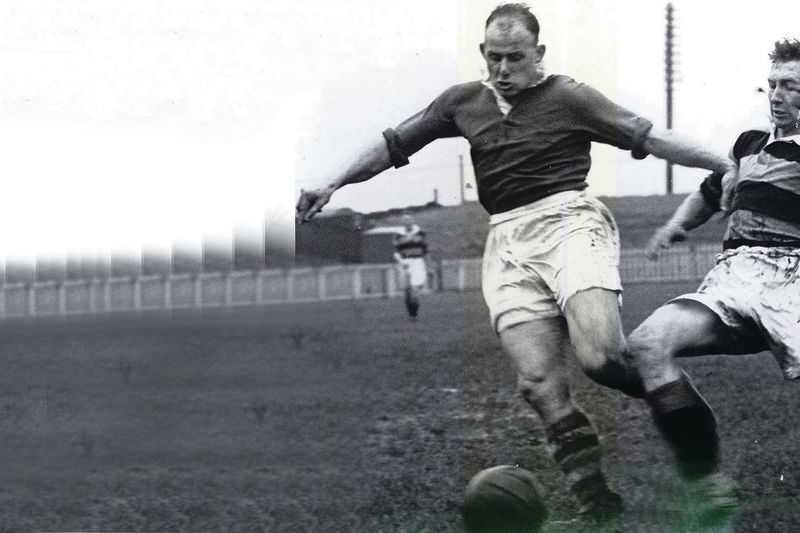
Jimmy Jones
Despite the setback of not being able to establish himself in another league, Jones returned to Northern Ireland and rejoined Glenavon. It was during this period that he experienced his most successful phase as a prolific goalscorer, finding the back of the net on more than 500 occasions over the course of a remarkable 12-year spell. Jimmy Jones stands the 8th position of "Players who has scored the most goals in football history" ranking.
Abe Lenstra
| Full Name | Abe Minderts Lenstra |
| Rank | 9 |
| National team | Netherlands |
| Total goals | 645 |
| Appearance | 650 |
| Current clubs/ Retired | --- |
| Career span | 1936-1963 |
Abe Minderts Lenstra, a revered figure in Dutch football during the 1950s, left a lasting impact as a forward and is considered one of the greatest players in the history of the Netherlands. He achieved legendary status, particularly with his hometown club, Heerenveen, where he rose to prominence.
Lenstra represented several clubs throughout his career, including SC Enschede, Enschedese Boys, PH: DOS '19, WSV, DOS Kampen, and vv LTC. However, it was at VV Heerenveen (now known as SC Heerenveen) where he initially caught the attention of the Dutch national team selectors. When professional football was introduced in the Netherlands in 1954, the 34-year-old Lenstra made the move from VV Heerenveen to the larger club, SC Enschede. It was during this time that he missed his best opportunity to win the Dutch title, as SC Enschede lost the first and last Eredivisie final in 1958 against DOS Utrecht after 180 minutes of play. In 1960, Lenstra joined rivals Enschedese Boys, where he concluded his professional career in 1963.
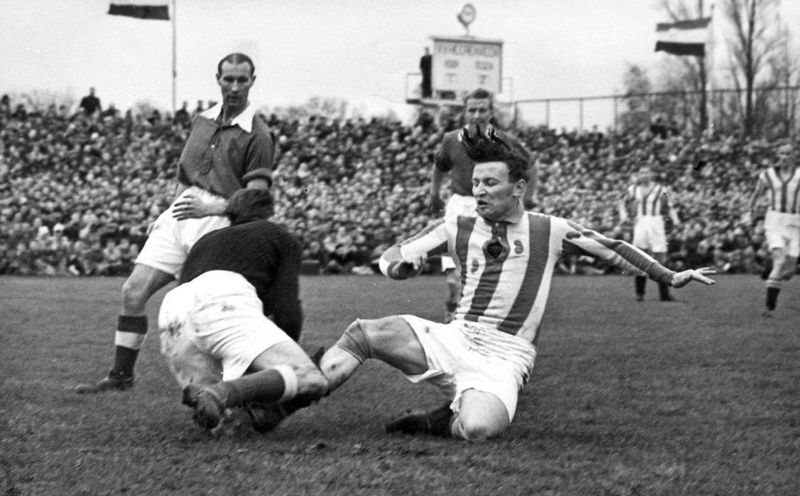
Abe Lenstra
Lenstra, who earned 47 caps for the national team and scored 33 goals, formed partnerships with other notable internationals such as Faas Wilkes and Kees Rijvers. He was known for his principled stance and refused to play for the national squad if he was not selected for his preferred position and one of players having the most goals in football for Netherlands.
Lenstra played a pivotal role in putting sc Heerenveen on the footballing map, leading to the affectionate nickname "Abeveen" for the club. In 1977, long after retiring from football, he suffered a brain haemorrhage, leaving him wheelchair-bound for the remainder of his life. He passed away in 1985, just days before the inaugural international match at the stadium that would bear his name a year later.
Eusébio
| Full Name | Eusébio da Silva Ferreira |
| Rank | 10 |
| National team | Portugal |
| Total goals | 620 |
| Appearance | 648 |
| Current clubs/ Retired | --- |
| Career span | 1957-1979 |
Eusébio da Silva Ferreira, known by various nicknames such as the "Black Panther," the "Black Pearl," or "O Rei" ("The King"), was a Portuguese striker widely regarded as one of the greatest footballers of all time. He is especially celebrated as the best player in the history of Benfica. Renowned for his speed, technique, athleticism, and powerful right-footed shot, he was an incredibly prolific goalscorer, tallying an impressive 620 goals in 648 matches.
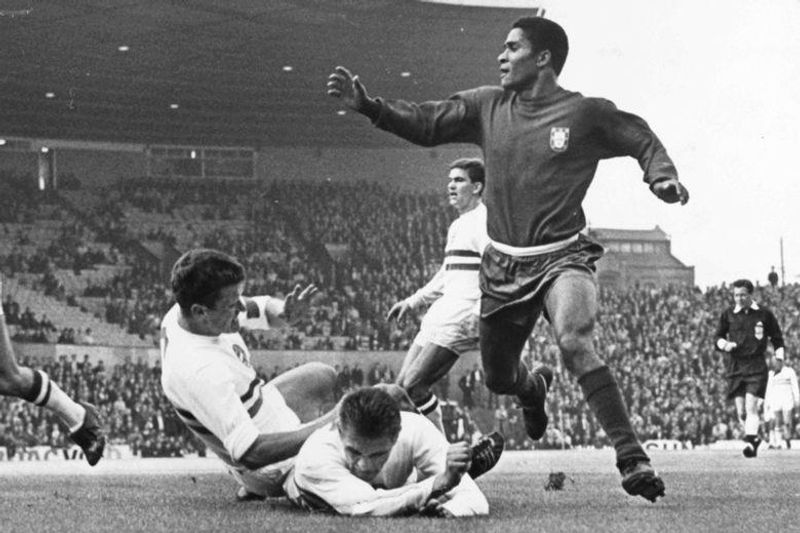
Eusébio
Eusébio played a crucial role in helping Portugal secure a remarkable third-place finish at the 1966 FIFA World Cup, where he emerged as the tournament's top goalscorer with nine goals. He was awarded the Ballon d'Or in 1965 and finished as a runner-up in 1962 and 1966.
Eusébio is known as one of players who has scored the most goals in football history. At Benfica, he holds the record as the club's all-time leading scorer with 473 goals in 440 competitive matches. His accomplishments include eleven Primeira Liga titles and a European Cup victory, while also playing integral roles in reaching additional European Cup finals in 1963, 1965, and 1968. In the pre-Champions League era of the European Cup, Eusébio ranks as the second-highest goalscorer, trailing only Alfredo Di Stéfano, with 48 goals. He claimed the European Cup top scorer title in 1964-65, 1965-66, and 1967-68. Additionally, he secured the Bola de Prata award for being the Primeira Liga's top scorer a record-breaking seven times. Eusébio was the first-ever player to win the European Golden Boot in 1968, a feat he replicated in 1973.
Following his retirement until his passing, Eusébio served as a football ambassador and remained one of the most recognizable faces of his generation.
FAQs -Who has scored the most goals in football history?
- The record for the most goals scored in a single season is held by Lionel Messi. In the 2011-2012 season, Messi scored a remarkable 73 goals in all competitions.
- Portugal’s Cristiano Ronaldo, with 122 goals in 198 matches and counting, has scored the most goals in international football in the men’s game.
- Currently, Cristiano Ronaldo is the players having the most goals in football with 837 goals after 1166 games.
- Yes, there are several active players who have the potential to break goal-scoring records. Players like Robert Lewandowski, Cristiano Ronaldo, and Kylian Mbappé have consistently displayed their goal-scoring prowess and could potentially challenge the existing records.
- The number of goals scored by a player can significantly impact their legacy. Prolific goal scorers often leave a lasting impression on fans and are celebrated for their extraordinary achievements. However, it's important to remember that football is a team sport, and a player's overall contribution to their team's success should also be taken into account.

Related Content

